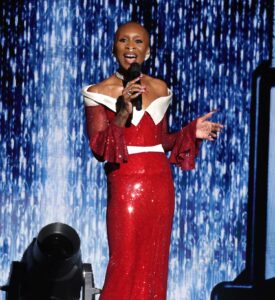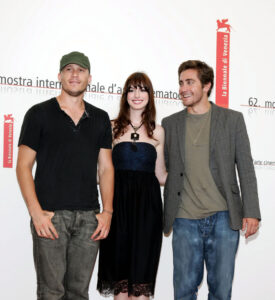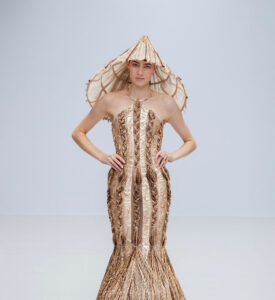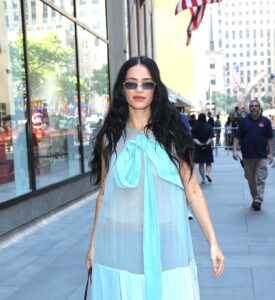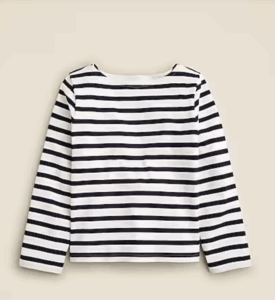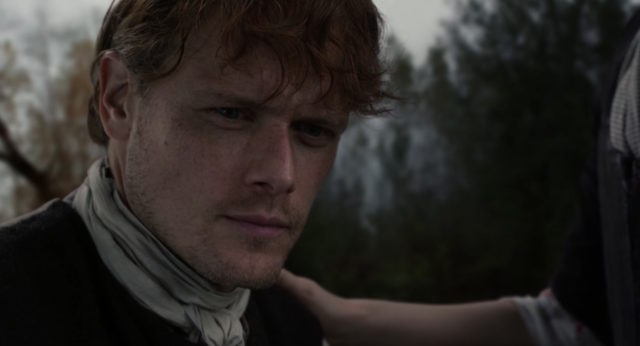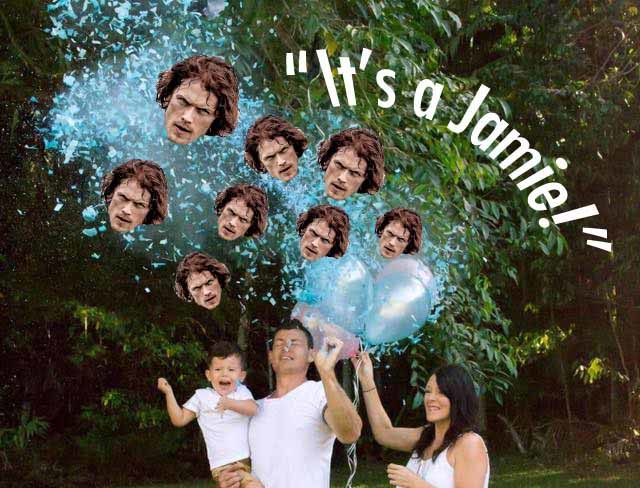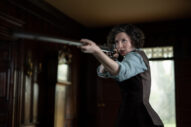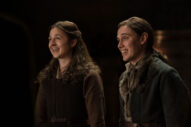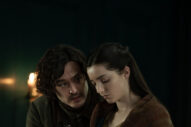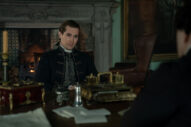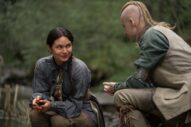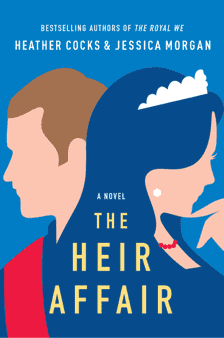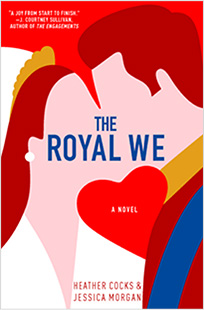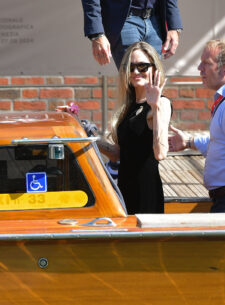Sorry for the tardiness; I was laid up with food poisoning, and let me tell you, it was a joy and a delight and I plan to lick a raw chicken breast at my earliest convenience. But an important note: I don’t know whether I will get to watch next week’s episode, as I’ll be in Canada, and the streaming rules are different there. So worst-case I will roll the next two Outlander episodes together after the Thanksgiving break, though I’ll do my damndest to get it if I can. Deal? Deal.
This episode of Outlander confronts slavery. I’ve read some criticism of it as being too much about how Claire feels and how she’s affected by it, but to a point I understand wanting Claire’s perspective: She’s both the main character and the viewer proxy, in the sense that she’s guided by a modern moral compass that closely resembles ours. She’s meant to make us wonder what any of us would do, after momentarily freaking out that time-travel is real, if we found ourselves plonked into a pre-war North Carolina plantation. Would we rock the boat, or sit down? But while there is a LOT of lip service paid to how the actions of one affect them all, Outlander generally only spends time defining the “all” as “Jamie and Claire and Jocasta and Ian.” I wish this show gave itself breathing room to go deeper. There is a necessary conflict between Claire’s clear-cut understanding of the wrongs of slavery, versus the societal norms of the time, the road blocks put up to ensure that it endured, and the sacrifices the slaves made simply to live. And so she’s going to be presented with constant unpleasant choices that make her complicit; a show with less interest in expedience might linger on those, and delve further into is how difficult it was to effect change in a society carefully built to oppress, versus how easy it might be to get sucked into an alternate sense of what Doing The Right Thing means. Jocasta is the very picture of that, but Claire’s struggles seem only skin-deep because the main goal seems to be, “Get through this in under an hour, snap-snap, move along, please, we have chapters to get through.” That means we can only sympathize with Claire’s plight so much, because at the same time, we can’t avoid thinking, “Okay, but you’re not exactly refusing the fruits of slave labor here…”
If the hour lacked depth of perspective on more than a small handful of the slaves, it did at least show how cruelly complicated it was for them all to survive in a place that cared little for their lives, and set traps around every corner. The rules were wholly stacked against them. It took a long, bloody war to change that; Claire seems at times aware of this, and then others vexingly surprised that she couldn’t just swoop in and impose her morality. In the end, I certainly came away from this reminded of what ills befall the world when it’s governed by people with fear of losing their ill-assumed superiority, and those are lessons that are always worth revisiting.
That said, of course Outlander is not super subtle about anything. But that’s okay. I’ve come to appreciate this show whacking me in the head with a phone book every week. Oh, and I should note that this season’s take on the theme song, with more of a chorus and some plucking banjos, is really kicky. Well done, Outlander. I never thought I’d say this, but I kind of miss Geillis? Batshittery was easier to recap.
We begin on the houseboat, where Jamie very torn up about Gruff Dude’s untimely murder:
Who bravely expired a hero
When the budget cut him like his throat?
It’s that surly Scot of whom much, we knew not:
Poor Gruff Dude, dumped dead off a boat.
While Jamie broods about how his friend is rotting in a hasty and shallow grave, Claire tries to reassure him that ANYONE would’ve gotten played by Stephen “Dimples” Bonnet, ladies’ man, man’s man, and hat about town. Before they can get in too deep, or even wonder why Bonnet killed only one of them (this still makes no sense to me), they arrive at River Run and are blown away by the sheer size of Aunt Jocasta’s home. Jamie feels a pang of frustration that he’s now merely a broke-ass hottie who can’t give Claire a life like this; Claire doesn’t care, I’m sure in part because they always seem to find rich relatives for whom money is no object (see: France), but also because what he can give her in orgasms is worth way more than a two-story house.
Aunt Jocasta is played by Maria Doyle Kennedy, whom you might recognize from Orphan Black, though she is an impressively prolific musician as well. And Jocasta has a surprise for Jamie:
Who enters slow and distant
And won’t quite look right atcha?
It’s Jamie’s aunt, and it’s ’cause she can’t:
She’s blind, is our Jocasta.
The show goes for maximum drama with the reveal, having her behave with what appears like an icy remove, complete with having her ignore Ian’s proffered posy until one of her slaves — the one who appears to act as her butler; he’s very well-dressed and manages the house, and is her right-hand man — apprises her of its presence. That’s when she reveals her sight is gone. ZING… I guess? I don’t know. I feel like I would have mentioned that up front. Otherwise, Jocasta is unnervingly well-drawn: She’s shrewd and smart and has a heart, but she’s also — by virtue of being a landowner of that era — Part Of The Problem, and either doesn’t know it or isn’t too fussed as long as she’s respected and successful. So she’s layered, and thus, I suspect we’re soon to be done with her.
Claire and Jamie are shown to a room, where they’re introduced to Phaedre and Mary, two slaves tasked with waiting on them. Phaedre has a Scottish accent. How likely would that have been in America at this time? Honest question. Ulysses, the trusted butler/houseman, sounds American with a tinge of Brit, but only a tinge. It strikes me unusual that one of them would sound Scottish, unless she’s picking up on vocal cadences from Jocasta (which Ulysses has not). They call her “mistress” and Claire immediately and warmly says, “Call me Claire.” The look on their faces, and Ulysses’, is one of mild horror.
This woman just showed up here
On a Murder Boat from God knows where.
And now she expects for us to risk our necks
By just calling her plain old Claire?
It’s very in-character of Claire to want to do that, though, and this is her first taste of having those overtures not warmly welcomed. “Um, Mistress Claire,” she amends, awkwardly. They all leave, and Claire wanders over to the windows to gaze out upon the slaves working the fields. “As you say, one day it’ll all be different,” Jamie offers, but she’s still nauseated. I kind of wish she’d called back the houseboat, or camped outside, instead sleeping in the bed they made.
But! No time for such trifles, apparently. Time for a levity break instead. Poor wolfy Rollo got sprayed by a skunk, so Jocasta called on a man named John Quincy Myers to come wash off the stench, and he and Ian get to banterin’.
Who’s woolly as a hulking mammoth
With equally outsize desires?
His carpeted rump he proudly will pump,
That lusty soul John Quincy Myers.
HI, JQM, MY NAME’S IAN!!!!
I GREW THIS BEARD ALL BY MYSELF!!
IT’S JUST A FEW STRANDS BUT I’VE GOT BIG THINGS PLANNED
AND I DON’T KNOW IF YOU’VE HEARD BUT I’M NOT A VIRGIN!
Seriously, this whole scene is JQM puffing out his chest and talking about how the Indian ladies looooove all his body hair because their dudes are so clean shaven: “Their own men barely have bristles on their bollocks, much let alone backsides. You take one look at my buttocks, you’d think my daddy was a buffalo.” Sexy. You know how Jamie had one spunky short friend and one more burly bearded one, back in Culloden days? And then they died and were replaced by new versions? Well, they’re both dead now, and John Quincy Myers is basically both of them rolled together. Outlander has found a way to be budgetarily efficient. Ian loves all his bawdy talk, then gets wide-eyed at the prospect of Indians and their women. He’s heard all kinds of stories about them ripping hearts out of people’s chests and eating them, see. JQM is like, “Uh, no,” but he does mention that they’ve been known to scalp an outsider. “There’s clan in Scotland that’ll do the same. You’ll not see a Campbell and a MacDonald together,” Ian muses. “Indians. Don’t sound much different than Highlanders!” Indians: They’re Just Like Us: They Were Rudely Shoved Off Their Land By a Bunch of Imperious Brits and Had The Audacity to Fight Back About It. I’m glad Ian and Jamie didn’t show up here all, “Wow, slavery is neat, and let’s get those natives off our lawns,” but still, I’m sure Diana Gabaldon was glad of the parallels here that made it a lot easier for her characters to be on the correct side of U.S. history.
Jocasta gives Claire and Jamie a tour of her very profitable lands. She proudly notes that she purchased her 152 slaves in lots to keep families together, which is a very nice gesture except for how she was buying human beings as if they were things, and to be her unpaid labor. Sadly, in the twisted morality of the time, that’s likely the closest anyone came to kindness. “Over the years, I’ve found my slaves to be more productive when treated with benevolence,” Jocasta says, somewhat smugly, which you’ll notice is not quiiiite the same thing as saying she cares about them in any real way. Claire has to be grateful that Jocasta is blind, because she does not have to conceal her grossed-out facial expressions. Indeed, she will soon be blind herself from rolling her eyes straight out of her head. Jamie, buttering the bread a little, compliments his aunt for not treating her slaves as no better than livestock, and again Jocasta’s answer is just left of caring: “Livestock?!? They’re a good deal more expensive than that,” she says, before patting herself on the back for giving them a life and a purpose, as if that was an act of salvation. It IS really difficult in this day and age to hear all these easy justifications for it, and this episode must have been very challenging to film. Claire looks like she wants to hurl all over Jocasta’s shawl. Jocasta concludes that she considers “some” of them to be friends, and Claire is like, “Riiiiiiiiight.” Jocasta hears Claire’s tone. “My slaves are quite happy here! Only a few have tried to run away over the years,” she chirps, and Claire’s “OMG WHAT” is amazing and the screenshot I got does not do it justice. Jamie pipes up to say that Claire’s mind and compassion are the things he cherishes about her, but the net effect is that they seem just to be going along with everything to reap the benefits of Jocasta’s hospitality, which… hmm.
And THEN, Claire, after her hostility about the slaves, announces she’s going to leave… because she has demanded the help of one of those slaves in refreshing her herb collection. What the what, friendo?
Hark! Hypocrisy
Has tootled its woeful horn
at your sorry bum.
Claire’s departure is just in time for her to avoid meeting a new character.
Who’s this inept little bewigged hustler
With an eye on Jocasta’s pad?
Ah yes, he grates, not ingratiates:
It’s Lieutenant Wolff, that cad.
Wolff is the steward of some Royal Navy contracts with River Run — Jocasta must supply them with much of her crop — and we learn later that he probably has designs on worming his way into Jocasta’s will by marrying her and taking control of this lush estate. So far, some of that is supposition, but it seems pretty likely. Today, he’s popped by to suggest she grow wheat along the riverbanks because she could fetch a nice profit by selling it to the Navy. Jamie snorts and points out that wheat would be very ill-suited to that land, but rice would be much better. Jocasta agrees that Jamie’s idea means she’d make a richer profit and handsomely feed her slaves (so I guess… we’re to think Jamie is a genius, rather than merely giving the slaves more to do?!?). Wolff, emasculated, scurries out. Jocasta grins that she’s pleased Jamie spoke his mind because often a woman’s opinion is not welcomed.
I would like to tell her to get ready for Hurricane Claire on that front, but sadly it’s more of a halting sneeze. While Claire stands in her bedroom and Mary and Phaedre tailor Jocasta’s old garments to her frame — something Claire could capably do, given that she made her own time-traveling garb out of unconventional materials; couldn’t she just trick blind Jocasta and sew them herself? — Jocasta says all sorts of things about how the cream-colored garment would best suit a blonde (doubtful) and, “I hope you’re not black-haired and sallow,” which has Phaedre snickering to herself. Then there is a weird moment where Phaedre, in describing Claire to Jocasta, fetishizes Claire skin as “white as milk” and says she has “bonny eyes of indigo” and a dreamy bosom and sooo tall. This whole section made me uncomfortable. Claire, who supposedly loathes everything of slavery, is standing there letting a slave both pin a garment to her body and then lavish her with compliments while she blushes?!? The show rockets right through that, though, preferring to make it about how awkward it is that Jocasta has a return volley for every one of them, like, “UGH, IS SHE WASHED OUT,” and, “WELL SOME GUYS PREFER SHORT WOMEN.” Jocasta doesn’t seem angry at Claire, particularly, but just maybe… passive-aggressive, in the wake of Claire’s few small comments?
Phaedre seems comfortable needling Jocasta, and she does here, noting that everyone thinks Lieutenant Wolff has designs on her. Jocasta blows it off in favor of asking Claire what she thinks of River Run, fully expecting to be lavished with compliments about her estate. She presses and presses because she wants to be told how fabulous it is, and all she gets from Claire are vague but accurate things like, “It’s all very overwhelming,” and, “I’ve never ….stayed…. anywhere… quite like it.” It sort of amazes me that after all these years, Claire has not gotten any better at spit-shining her sentences. Jocasta is basically like:
Who is this sallow Sassenach
Bringing to my estate her airs?
You’re at River Run; you’d better love it, hon,
Or I’ll river run you OUTTA here, Claire.
Finally, Claire admits she doesn’t agree with slavery. As a slave continues to tailor her expensive frock. Jocasta wonders if she’s a Quaker, because otherwise, it makes no sense to have those views. Claire rustles up a convincing lie about healing some Quakers and learning from their opinions. “Hmm,” Jocasta says. “Jenny was right about you. You are a peculiar lass,” she adds, saying that Jenny told her that Claire is very headstrong and has no problem speaking her mind even if she doesn’t know the half of things. Claire bristles, “The same could be said for Jenny,” which at least amuses Jocasta. She seems to appreciate “the fire of Mackenzie” in Claire, although given the other Mackenzies we’ve met, that’s not necessarily a compliment. And once again, a conversation that purported to be about Claire having an opinion spins instead into one about Claire herself, while the resistance peters out and dies.
Next, a signature Outlander Fancy Party Wherein Claire Horrifies People With Her Progressive Views. Jocasta is ostensibly throwing it to welcome her nephew, and Claire is chatting with Wolff and an advisor of Jocasta’s named Farquard Campbell, and she defends the Indians for wanting to have a voice in how America is developed. “The Indians were on these lands first, were they not?” Ian adds, as he nurses a glass of wine.
HEY LOOK IT’S A GROWN-UP PARTY
AND I’M DRINKING GROWN-UP WINE
AND I SAID A GROWN-UP SENTENCE, CLAIRE!
NOW CAN YOU PLEASE EXPLAIN TO ME WHERE I AM SUPPOSED TO BE GROWING MAN HAIR BECAUSE I AM NOT CLEAR ON THIS! IAN!!!
Wolff then defends colonization by saying that were it not for the Romans, Great Britain would never have developed, and they’d all still be huddling in mud huts with only primitive amenities. I find it amusing, because it hinges on the idea that the Brits were incapable of coming up with any of this stuff themselves, and I cannot imagine the Imperial-era Brits EVER lacking self-esteem in that way and saying out loud that they’d still be cavepeople without Rome coming along and taking over for a bit. Anyhoo, this ends with, “The savages should be thankful we’re here to spare them a similar fate,” and Claire stalks off in disgust. To drink her wine. That a slave poured and served her.
Jocasta takes this moment to make a toast to Jamie, in which she announces the true purpose of this party: Jamie will be named the sole heir to River Run, and immediately begin managing the estate. I love the idea of an heir-naming party. Maybe this can take the place of gender reveals.
Later, Jamie is fuming, calling it a pure Colum Mackenzie move to do that publicly without even asking him first. Claire is freaking out that she cannot and will not be a slave owner. He agrees, but he wonders if perhaps owning a plantation might be their way to begin the path to freedom. “Maybe we can make a small difference for those in our part of the world. A spark might light a fuse,” he says, optimistically. Claire looks totally miserable. “Fuses often lead to explosions,” warns Claire, which is rich, as she is THE QUEEN of waving lit matches around metaphorical TNT. Indeed, she has been half-heartedly lighting matches all day, and later she lights a spark that leads to AN ACTUAL TORCH-WIELDING MOB. Either she objects to owning slaves, or she objects to making a stink, and this scene somehow tries to have it both ways and fails.
Still, Jamie tells Jocasta and Farquard Campbell that he can’t accept this offer unless she agrees that he can free all the slaves. Farquard nearly chokes on his pipe.
FREE SLAVES COUGH COUGH CHORTLE
TIS THE ACT OF A MADMAN TO BE SURE
ACK HACK CHORTLE CHOKE GASP BLAKE BORTLES
WHAAAAAAAAAAAAT THE HELL.
Jamie’s pitch is to let them each earn a fair wage, and Jocasta — sly one that she is — soothes him by pretending (I think) to be willing to hear the possibility, then suggesting they “benefit from your wisdom, Mr. Campbell,” knowing full well that Campbell will outline all the reasons why it’s impossible. And he does: The county court requires that each slave be proven to have saved a life in order to be freed, and if that’s proven true, they need a bond to ensure good conduct and more cash besides. “You cannot put a price on freedom,” Jamie growls. “But the Assembly can,” Farquard says. “And does.” It’s 100 pounds per slave, if they can even prove all 152 of them have behaved heroically. Jamie is aghast. “You’ll put lives at risk, not least your own,” Farky intones. “There have been others that have shared your views on the matter. They’ve disappeared. Never heard from again.”
Outside, Claire and Jamie break down the realities. “Nothing will change under these laws,” Claire wah-waaahs. So Jamie suggests they ditch River Run and gain their land the old-fashioned way: getting a job and working their way up to it. No, wait, not that way. A shortcut way: taking that easy offer of a grant from the governor, and then recruiting settlers to work for a wage rather than owning slaves. Claire reminds him that this ultimately would force them to fight for the British in the Revolutionary War, but the fact that they keep mentioning it makes me wonder if it happens anyway. Before they can come to an answer, they’re called to tend to “a matter of bloodshed” with one of the slaves, who cut off a white man’s ear. Jocasta gives Jamie some guns and Claire grabs some medical supplies to try and reattach the ear. On the way, they learn the slave — Rufus — swung the axe after the man lashed him, and that what Jamie’s expected to oversee here is Rufus’s execution for spilling the blood of a white man. Claire does not care for this, and her feelings are furthered when they arrive in the woods and see that Rufus is being strung up in a tree via a metal hook lodged in his side. Jamie whips out his guns and orders them to cut down Rufus, as Claire totally passes over Earless Joe in his favor. Farquard points out that torturing Rufus was illegal rogue justice — because I guess the law says he has to be murdered in a dignified way?!? Gee, thanks, laws — and Claire convinces them all to take Rufus back to River Run’s dining room so she can turn it into an operating theatre.
It will not shock you to know that Claire successfully removes the hook and stitches up Rufus’s wounds, aided by Ian and Phaedre (I’ll accept her ordering around Phaedre and Mary here because she is ordering EVERYONE around in the same way). But Jocasta is HELLA pissed. “It seems Mistress Claire is trying to HEAL the slave,” Ulysses says to her, and Jocasta is like, “Um, that wasn’t THE JOB.”
Wolff and Farquard Campbell pop over to warn everyone that this was a big mistake, that the law is the law and Rufus must be hanged for his crime, and that all the plantation owners are gossiping about Jamie’s foolishness right now. Jamie gets all macho: “It’s no concern of theirs. Rufus is under my protection.” Wolff is not impressed with the size of Jamie’s schlonghood: “If order is not maintained, there’s no telling what riotous behavior could ensue.” He threatens to jail Jamie and Claire for taking the law into their own hands. Jocasta asks for mercy and time to fix this, pleading Jamie’s ignorance of the laws.
Night falls. Rufus is alive, but confused as to where he is and why Claire healed him: “You were there. You know why I was on that hook.” She handwaves it and calls the guy a son of a bitch. Rufus is like OMG SUCH TALK FROM A LADY, and Ian pipes up that “son of a bitch” is NOTHING when it comes to his Auntie Claire.
I’VE SEEN HER DIG OUT A BULLET
AND KILL A MAN AND DRILL HIS BRAIN
SHE WHACKED OFF THE HEAD OF THE LADY IN RED
WHO DID SEX ON ME, LOTS OF IT, BY THE WAY, EVER SO MUCH, AND ANYWAY YES OF COURSE AUNTIE CLAIRE IS SCARY BUT KIND OF GREAT AND I STILL DON’T UNDERSTAND HER BUT WOMEN ARE LIFE’S GREATEST MYSTERY!!! IAN!!
And now the show is like, “Oops, character development,” so Claire gently asks about Rufus’s past and his family. Deepening him at this point is really just to further our sympathies for Ian — who cries — and Claire, his benevolent healer. Sigh. Claire sets about cleaning up, and runs into a disapproving Ulysses. Claire correctly reads that something is bugging him, and Ulysses urgently whispers that her actions have made things worse for Rufus and everyone else: “Saving that boy’s soul is all that can be done for him now,” he says. “Once the overseers come, they will tear the limbs from his body and leave what little is left behind as a warning for the rest of us.”
Ah, but they’ve come, and they are enraged. They are Gaston and the villagers squawking about killing the beast, but without any anthropomorphized furniture to save the day. “That isn’t the law. It’s a mob,” Jamie says, but Jocasta points out that it doesn’t matter. They’ll just torch the place if they don’t get what they want, and who would stop or fight them? Already they’re hurling bricks through the windows. Jocasta buys them until midnight to turn over the body, but Jamie realizes they’re stuck before Claire does. He has to ask Claire the question, “If you do save him… what then?” Claire fumbles that maybe they can say he escaped, but Jamie points out that the law says the next recourse is to punish all the other slaves who were out there with him that day. Rufus cannot be saved at this point — he will be ripped apart, quite literally, no matter what — so Jamie believes it’s a matter of whether they fight for the moral high ground, even if they are burned alive and get 152 slaves killed doing it, or whether they cede one doomed man to preserve the lives of others. Since there’s no guarantee Rufus would yet survive this wound, Jamie suggests giving Rufus a cup of the ol’ Colum Death Tea to bring him to a painless, peaceful end, so that his soul can move on before his body is destroyed. Claire hates this compromise, but knows it’s probably all she can do. This all would have packed more of a punch, I think, if we hadn’t spent more time with white people discussing Rufus than we did with actual Rufus.
And boy, the show really draws all that out, cutting between Claire’s deliberations, and the mob, and Jocasta’s protestations, and the ticking clock, and Claire slowly making the tea and feeding it tearfully to Rufus. I almost wish Rufus had been given a voice in his fate, frankly. It wouldn’t have been unlike Claire to level with him and therefore give him a (woefully tiny) piece of the agency he had in life been denied. But as heavy as the hands were here, I was moved by Rufus’s death, because the actor does a nice job and because it’s such a harrowing microcosm of a vile chapter of American history. However, if the show is going to insist upon things being All About Claire, I do wish once again that it didn’t also turn off the spigot of her memories. I talked about this a bit last season, but Joe Abernathy was meaningful in her life, and she never talks about him at all, nor appears to think about him. And I think it’s unrealistic that she wouldn’t have drawn some parallels aloud to Jamie or in her own head, hailing as she does from a time of its own civil rights tensions, and having seen Joe rise and then been a party to this man’s fall. It’s just weird.
In sum: This was all over the place. Moving in places, inconsistent in others, and frustrating for what could have been. The Claire who said, “Nothing will change under these laws,” suddenly seemed really surprised about those laws. I know the books are dense, and some things get skipped in order to keep the seasons tight, but… don’t you think Starz would do as well with a few more hours per season to get it right?
Next week: More traveling! More peril! And sad gentle Roger returns to continue his sad gentle pursuit of Brianna! I hope I can watch it on time.
